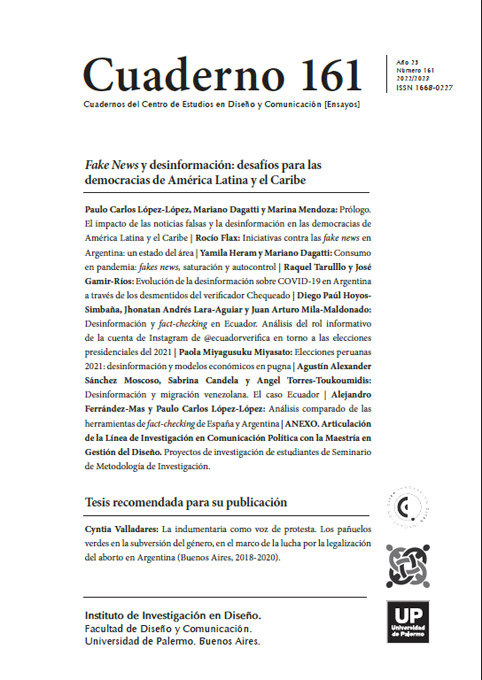Análisis comparado de las herramientas de fact-checking de España y Argentina
Abstract
The spread of fake news is an emerging phenomenon in our society that endangers elements as essential as politics, the economy and even public health. In this context, news verification tools are a very valuable tool to prevent the spread of any false information through the media or social networks. The following research analyzes these tools in the media systems of Spain and Argentina, revealing organizations with quite similar characteristics between both systems, transparent fact-checking institutions, with an argumentative verification method that is provided with verification scales to accompany the final result and with a plurality in terms of the project model that is presented in both countries.
References
Adair, B. y Thakore, I. (2015). Factcheking census finds continued groth around the world. Duke Reporter’s Lab. Recuperado de: https://reporterslab.org/fact-checking-censusfinds-growth-around-world/
Allcott, H. y Gentzkow, M. (2017). Social Media and Fake News in the 2016 Election. Journal of Economic Perspectives, 31(2), 211-236. https://www.doi.org/10.1257/jep.31.2.211
Amazeen, M. A. (2017). Journalistic interventions. The structural factors affecting the global emergence of fact-checking. Journalism, 21(1), 95-111. https://doi.org/10.1177%2F1464884917730217
Amazeen, M. A., Thorson, E., Muddiman, A., & Graves, L. (2015). A Comparison of Correction For- mats: The Effectiveness and Effects of Rating Scale versus Contextual Corrections of Misinformation. American Press Institute. https://www.americanpressinstitute.org/wp-content/uploads/2015/04/The-Effectiveness-of-Rating-Scales.pdf
Amorós, M. (2018). Fake News. La verdad de las noticias falsas. Plataforma Editorial.
Cárdenas Rica, M. L. (2019). Análisis de las iniciativas de fact-checking en España. Revista Inclusiones, 6(Especial), 62-82.
Chan, M. S.; Jones, C. R.; Jamieson, K. H. y Albarracín, D. (2017). Debunking: A Me- taAnalysis of the Psychological Efficacy of Messages Countering Misinformation. Psychological Science, 28(11), 1532-1546. https://doi.org/10.1177/0956797617714579
Choi, S. (2015). The Two-Step Flow of Communication in Twitter-Based Public Forums. Social Science Computer Review, 33(6), 696-711. https://www.doi. org/10.1177/0894439314556599
Currie-Sivek, S. y Bloyd-Peshkin, S. (2018). Where Do Facts Matter? Journalism Practice, 12(4), 400-421. https://doi.org/10.1080/17512786.2017.1307694
Duke Reporter’s Lab. (2022). Fact-Checking. Duke Reporter’s Lab. https://reporterslab.org/fact-checking/
Elizabeth, J. (2014). Who are you calling a fact checker? American Press Institute. https://www.americanpressinstitute.org/fact-checking-project/fact-checker-definition/
Graves, L. & Cherubini, F. (2016). The rise of fact-checking sites in Europe. Reuters Institute Digital News Report, 1-40. Recuperado de: https://bit.ly/2U7xZqw
López-López, P.C., Lagares Díez, N. & Puentes Rivera, I. (2021). La inteligencia artificial contra la desinformación: una visión desde la comunicación política. Razón Y Palabra, 25(112), 5–11. https://doi.org/10.26807/rp.v25i112.1891
López Pan, F. y Rodríguez Rodríguez, J. (2020). El Fact Checking en España. Plataformas, prácticas y rasgos distintivos. Estudios sobre el Mensaje Periodístico, 26(3), 1045-1065.
Marietta, M. y Barker, D. (2019). One Nation, Two Realities. Dueling Facys in American Democracy. Oxford University Press.
Martin, N. (2017). Journalism, the pressures of verification and notions of post-truth in civil society. Cosmopolitan Civil Societies: An Interdisciplinary Journal, 9(2), 41-56. https://www.doi.org/10.5130/ccs.v9i2.5476
Nyhan, B.; Porter, E.; Reifler, J. y Wood, T. J. (2020). Taking Fact-checks Literally But Not Seriously? The Effects of Journalistic Fact-checking on Factual Beliefs and Candidate Favorability. Political Behavior, 42, 936-960. https://doi.org/10.1007/s11109-019-09528-x
Nyhan, B. & Reifler, J. (2010). When Corrections Fail: The Persistence of Political Misperceptions. Political Behavior, 32(2), 303-330. https://doi.org/10.1007/s11109-010-9112-2
Palau-Sampio, D. (2018). Fact-checking y vigilancia del poder: La verificación del discurso público en los nuevos medios de América Latina. Communication & Society, 31(3), 347-365.
Redondo, M. (2018). Verificación digital para periodistas Manual contra bulos y desinformación internacional. UOC.
Shin, J. y Thorson, K. (2017). Partisan Selective Sharing: The Biased Diffusion of Factchecking Messages on Social Media. Journal of Comunication, 67(2), 233-255. https://doi.org/10.1111/jcom.12284
Stencel, M. (2016, febrero 16). Global Fact-Checking up 50% in Past Year. Duke Reporter’s Lab. https://reporterslab.org/global-fact-checking-up-50-percent/
Vizoso, A. & Vázquez-Herrero, J. (2019). Plataformas de fact-checking en español. Características, organización y método. Comunication & Society, 32(1), 127-144.
Wintersieck, A. L. (2017). Debating the Truth: The Impact of Fact-Checking During Electoral Debates. American Politics Research, 45(2), 304-331. https://doi.org/10.1177/1532673X16686555
Los autores/as que publiquen en esta revista ceden los derechos de autor y de publicación a "Cuadernos del Centro de Estudios de Diseño y Comunicación", Aceptando el registro de su trabajo bajo una licencia de atribución de Creative Commons, que permite a terceros utilizar lo publicado siempre que de el crédito pertinente a los autores y a esta revista.


